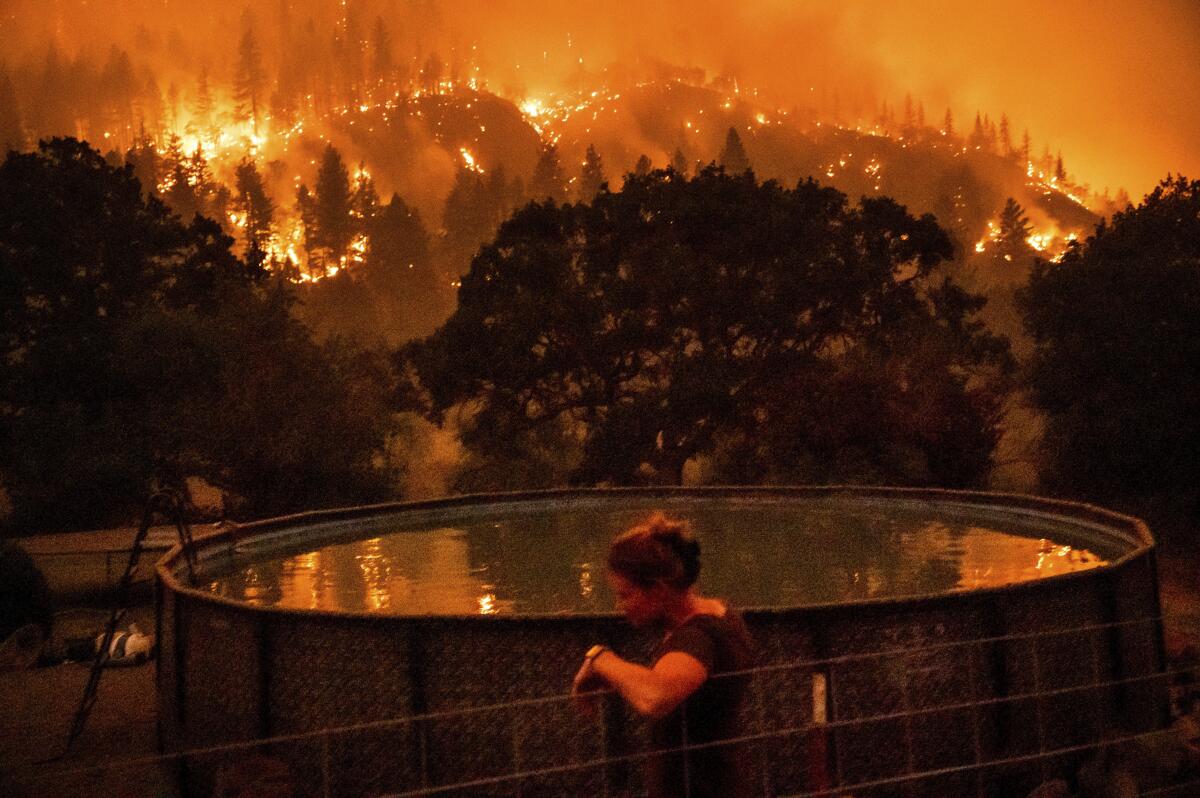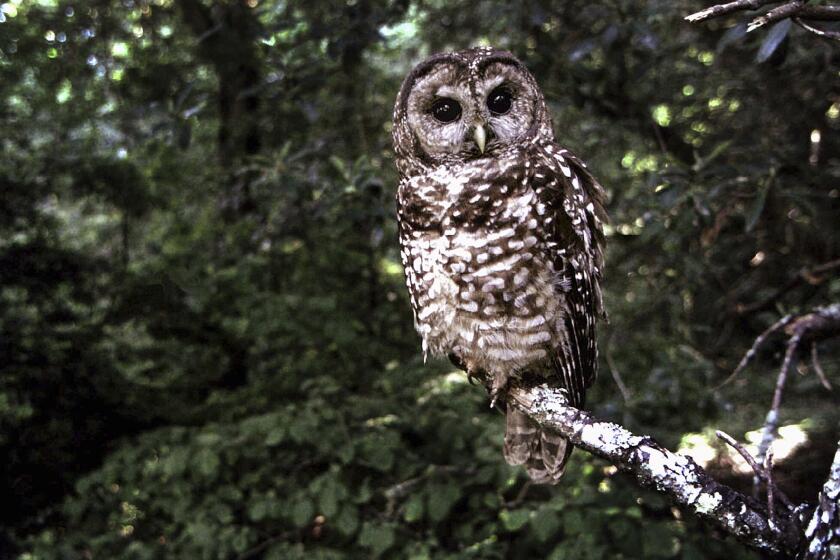2 found dead in car as raging McKinney fire grows to become California’s largest of year

- Share via
In the 20 years they’ve lived in Yreka, Calif., Vina Swenson and her husband have packed up their car and prepared to flee from fire five times — twice in the last two years.
“We haven’t ever had to leave,” Swenson said Sunday, as flames burned less than five miles away. “So the reality probably hasn’t hit me” that this one could swallow up their home.
As of Sunday night, the McKinney fire — the largest yet of this year’s fire season in drought-stricken California — had ripped through more than 55,000 acres in Klamath National Forest near the California border with Oregon, destroying homes and threatening hundreds more. It was 0% contained.
Authorities announced Monday that two people were found dead inside a car in the fire zone.
“Sunday fire personnel located two deceased individuals inside a vehicle located in a driveway along Doggett Creek Rd, off HWY 96, W of Klamath River, CA. There will be no additional info pending positive identification & notifications to next-of-kin,” the Siskiyou County sheriff said on Twitter.
Swenson, 54, watched as firefighters cut down brush across the street from her home, which sits in a basin surrounded by heavily forested mountains in the Northridge neighborhood, squarely in the town’s evacuation zone. The sun was trying to peer through the smoke, turning her neighborhood an eerie orange.
“It’s reassuring that they’re keeping us safe, but the fact that they’re clearing brush here makes me think they expect the fire to reach here,” Swenson said. She said they’ll leave as soon as they see flames coming over the surrounding mountains.
About 650 firefighters battling the blaze were contending with triple-digit heat and possible thunderstorms that could set off dangerous conditions. A red flag warning was in effect due to searing temperatures, which averaged about 100 degrees on Sunday, officials said.
“The fire becomes more energetic, and the potential for fire spread increases,” said Jonathan Garner, a meteorologist with the National Weather Service. “It just becomes a more active fire when temperatures warm up like that.”
Thunderstorms were expected in the afternoon, which he said could cause gusty, erratic winds and lightning, which could ignite new blazes.
That all makes for unpredictable fire behavior. “And that’s dangerous for firefighters,” Garner said.
By Sunday afternoon, forest officials said, there were about 10 other smaller fires burning in Klamath National Forest.
One of the firefighters on the front lines is Tyler Johnson, 21, who checked in with his mother, Diane, on Sunday morning before heading out on a shift.
That’s their routine, she said. At the end of his rest break, he’ll call to say that he’s headed to the command center, then back into the fray.
“It’s just a quick ‘I love you, be safe,’” Diane Johnson said, a hitch in her voice.
The 49-year-old county planner had evacuated to Placerville about four and a half hours away. Her husband, a sheriff’s deputy, stayed behind to help with evacuations in Yreka and ensure that homes are not looted.
Some neighborhoods on the western side of Yreka were ordered to evacuate, though officials said they saw little progression overnight on the fire’s edge closest to the city.
“Definitely Yreka is of concern as is the other populated areas like Fort Jones,” said Caroline Quintanilla, spokesperson for the U.S. Forest Service. “So we’re focusing on protecting the people, life and property.”
Officials said firefighters Sunday were prioritizing protecting Fort Jones, Yreka and other communities in the Highway 96 corridor from the blaze, which could burn for weeks. Highway 96 was shut down along the Klamath River, where crews overnight worked to keep homes and buildings from burning, forest officials said in a social media update.
Quintanilla said firefighters were tapping old bulldozer lines from past fires in the region.
“This area gets lots of fires,” Quintanilla said. “But the particular area where the fire is actually burning right now has not burned since the mid-’50s. So that’s part of the concern as well, and part of the complexity, because it hasn’t burned in a long time.”
Jonathan Dixon, 37, who lives on the western edge of Yreka, told The Times his home will probably be among the first to be scorched as the fire continues to spread.
He said he’s fled to the Bay Area, and that he expects his collection of art nouveau antiques, sculptures and other artworks to perish.
“I’m terrified that my house is going to burn down, and I’ve kind of accepted it,” Dixon said.
Dixon, a card dealer and games supervisor at the local casino, tried to put a positive spin on his losses, saying that he was “kind of a hoarder” and that he’s been intending to get rid of things.
“That’s a problem that’s solved, but not in the way I wanted,” he said.
Still, he said the casino might have to close as well, and if that happens he could lose his home and a source of income. He’s been urging other reluctant relatives to leave Yreka as soon as possible and to forgo trying to save their possessions.
“I was telling them don’t worry about packing up, your life’s more important, just get out of there,” Dixon said.
Many residents in this neighborhood around Humbug Road are elderly, Dixon said, and will probably face significant hurdles trying to leave.
Jan Williamson, 66, fled her house in the Northridge neighborhood along with her husband and 40-year-old daughter Leanne, a quadriplegic with cerebral palsy.
Williamson said the evacuation has been especially difficult on Leanne because she is severely autistic and has been agitated as her daily routines of watching TV and listening to music are disrupted. The Williamsons have had to isolate themselves in their motor home because of the heavy smoke in the air.
Trapped and with no ability to speak, Leanne tends to bite herself “hard and often” when she’s frustrated, her mother said.
Jan Williamson and her husband have had to leave behind an array of equipment used to care for their daughter, including an electric lift system that ferries her from the bed to the bathroom.
“Whenever it’s especially bad like this, we just have to take one or two minutes at a time, and just manage to get through each day,” Jan Williamson said.
The Red Cross late Saturday opened a shelter in the town of Weed after closing its location in Yreka when the area was ordered to evacuate, said Stephen Walsh, a spokesman with the organization.
Twenty-two people are staying at the shelter, where they’re being offered beds, food and spiritual care, Walsh said.
“They can stay as long as they need to, and obviously the shelters are open to everybody,” he said.
Siskiyou County officials set up a webpage to help residents find dogs, cats and livestock rescued within the evacuation area. The animals were being cared for at various shelters.
The fire started about 2:38 p.m. Friday near Highway 96 and McKinney Creek Road southwest of the Klamath River, according to the California Department of Forestry and Fire Protection. The cause is under investigation.
More to Read
Sign up for Essential California
The most important California stories and recommendations in your inbox every morning.
You may occasionally receive promotional content from the Los Angeles Times.












